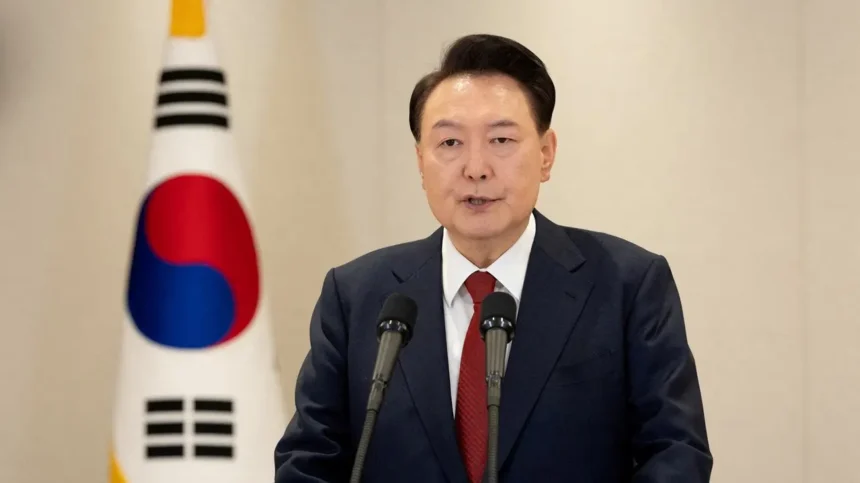South Korea is currently experiencing a deepening political crisis as the Corruption Investigation Office (CIO) intensifies its efforts to arrest impeached President Yoon Suk Yeol. The request for police assistance follows a week-long standoff, during which the embattled former prosecutor has defied multiple attempts by investigators to surrender for questioning regarding his alleged role in a failed martial law bid. Yoon, who has been at the center of one of the country’s most significant political scandals in recent decades, has remained barricaded inside his residence, refusing to comply with the legal demands.
Background of the Crisis
Yoon’s presidency has been marred by controversies and accusations, with the latest being charges of insurrection for allegedly attempting to suspend civilian rule and initiate a martial law declaration. This action, if true, could lead to severe consequences, including imprisonment or even the death penalty. Despite the gravity of the accusations, Yoon and his supporters remain defiant, accusing the CIO of overstepping its bounds and overreaching in its investigation. The political situation has escalated to the point where South Korea is facing its worst political crisis in decades, with deep divisions forming between supporters and critics of the impeached leader.
The investigation into Yoon’s actions began following reports that he had initiated a martial law order without the consent of key cabinet members. This development has sparked widespread protests, both for and against his leadership, leading to a tense standoff between demonstrators, law enforcement, and political authorities.
The Standoff and Investigations
The immediate trigger for the current standoff between Yoon and the CIO occurred last week, when investigators attempted to arrest the former president for questioning. The move came after the CIO issued an arrest warrant in connection with his alleged martial law attempt. However, the initial attempt ended in a dramatic standoff, as Yoon refused to surrender and instead took refuge in his residence. This forced the CIO to delay further action and extend the arrest warrant, which was set to expire on Monday. The CIO has since signaled its intention to request an extension from the court to continue its pursuit of Yoon, emphasizing the importance of gathering evidence to move forward with legal proceedings.
At a press briefing, CIO deputy director Lee Jae-seung confirmed the plan to seek an extension of the arrest warrant, stating that they would also coordinate with the police on the timing of any renewed attempts to arrest Yoon. The tension surrounding the case has now escalated, with both sides bracing for what could be a volatile outcome.
Protests and Political Divisions
The crisis has ignited strong reactions from both sides of the political spectrum. Pro-Yoon lawmakers from the People Power Party have rallied in support of the impeached president, gathering outside his residence early on Monday. These supporters argue that the investigation is politically motivated and designed to weaken Yoon’s leadership, viewing the CIO’s actions as an overreach by the executive branch.
On the opposite side of the political divide, demonstrators and opposition groups have taken to the streets, condemning Yoon’s actions and demanding accountability. In response to the growing protests, police have erected barricades around Yoon’s residence in anticipation of further unrest. The protests have intensified in recent days, with participants braving freezing temperatures to voice their displeasure with the political crisis.
One prominent protest organizer, Kim Soo-yong, vowed that the Presidential Security Service would continue to protect Yoon. His comments underscored the fierce loyalty and resolve of Yoon’s supporters, who are determined to prevent his arrest. “The Presidential Security Service will protect the President, and we will protect the Presidential Security Service till midnight,” Kim declared, signaling that they would not back down without a fight.
International Implications and Security Concerns
Meanwhile, the political turmoil has coincided with heightened regional security concerns. U.S. Secretary of State Antony Blinken arrived in Seoul for talks with South Korean officials, including acting President Choi Sang-mok. Blinken’s visit, which was initially planned to focus on diplomatic and economic issues, was swiftly diverted toward addressing the increasing tensions on the Korean Peninsula.
North Korea’s recent launch of an intercontinental ballistic missile (ICBM) further shifted the focus of discussions. The missile test, which occurred shortly before Blinken’s press conference, has raised alarm among regional powers and added a layer of complexity to an already volatile situation in South Korea. Blinken’s presence in the country highlights the importance of maintaining stability in the region amid mounting political and security challenges.
Impeachment Trial and Legal Proceedings
The political drama in South Korea shows no sign of resolution, as the country now faces unprecedented uncertainty. Yoon’s impeachment trial is set to begin on January 14, when the Constitutional Court will hear the case to determine whether his removal from office is justified. This trial could continue even if Yoon remains absent from the proceedings, adding further complications to an already contentious situation.
Key pieces of evidence that may be presented during the impeachment trial include a prosecutor’s report, which revealed that Yoon disregarded objections from senior cabinet members when attempting to impose martial law. This report is expected to play a significant role in the trial, as it could provide critical evidence of Yoon’s alleged misconduct and violations of constitutional law.
The outcome of the trial will have far-reaching consequences for both Yoon and South Korea’s political future. If the Constitutional Court rules to permanently remove Yoon from office, it would be a significant blow to the legitimacy of his presidency. On the other hand, if the court reinstates his presidential powers, it would likely exacerbate political tensions and further deepen the divide between his supporters and detractors.
Constitutional Court Decision and Potential Consequences
South Korea’s Constitutional Court has 180 days to render its decision regarding Yoon’s impeachment. This decision could determine whether Yoon is permanently removed from office or whether his presidential powers are reinstated. Should Yoon be removed, South Korea would face the prospect of a political vacuum, with the need for fresh elections and a new leader to steer the country through a period of intense instability.
Alternatively, if the court decides to reinstate Yoon, it could have significant consequences for the rule of law in South Korea. Evasion of court-ordered detention would likely further erode public trust in the legal system, raising concerns about the potential for unchecked executive power and the undermining of democratic principles.
Conclusion
The unfolding political crisis in South Korea is a momentous and unprecedented event in the country’s modern history. The attempt to arrest impeached President Yoon Suk Yeol has sparked a wave of protests, standoffs, and political maneuvering, dividing the nation along ideological lines. As the country grapples with the fallout from Yoon’s alleged actions, the legal proceedings, protests, and international concerns continue to shape the trajectory of South Korea’s political future.
With tensions running high, the upcoming impeachment trial and the Constitutional Court’s decision will be pivotal in determining whether Yoon remains in power or if his presidency is permanently brought to an end. The political outcome will not only affect Yoon’s fate but also have lasting implications for the stability of South Korea’s democratic institutions and the broader geopolitical landscape of the region.




